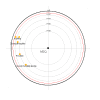Reduction in psychotic symptoms as a predictor of patient satisfaction with antipsychotic medication in schizophrenia: data from a randomized double-blind trial
- PMID: 17054789
- PMCID: PMC1626455
- DOI: 10.1186/1471-244X-6-45
Reduction in psychotic symptoms as a predictor of patient satisfaction with antipsychotic medication in schizophrenia: data from a randomized double-blind trial
Abstract
Background: Patient satisfaction with antipsychotic treatment is important. Limited evidence suggests that satisfaction is associated with symptom improvement and compliance. Predictors of patient satisfaction with antipsychotic medication were examined in a study of patients with a recent exacerbation of schizophrenia.
Methods: Data are from a randomized, double-blind trial comparing risperidone (n = 152), quetiapine (n = 156), and placebo (n = 73). Medication Satisfaction Questionnaire (MSQ) was completed after 14 days of treatment and after 6 weeks at last study visit.
Results: Medication satisfaction at both time points was significantly associated in multiple regression analysis with improvement on 3 Positive and Negative Syndrome Scale (PANSS) factor scores (positive symptoms p < .01; uncontrolled hostility/excitement, p < .0005; anxiety/depression, p < .04) and treatment with risperidone (p < .03); at day 14, significant association was also found with older age (p = .01). At both time points, predictor variables explained over 30% of the variance in medication satisfaction. Change in Hamilton Depression Scale, prolactin levels, sex, and reported adverse events of extrapyramidal symptoms, sedation, and movement disorders were not significant predictors of satisfaction. Lower level of medication satisfaction at day 14 was associated with earlier discontinuation in the trial at week 6 end point. A focused principal components analysis of PANSS factors and MSQ suggested that medication satisfaction relates to 3 groups of factors in descending order of magnitude: lower levels of (a) uncontrolled hostility/excitement, (b) positive symptoms, and (c) negative symptoms, disorganized thoughts, and anxiety/depression.
Conclusion: Results give further support that treatment satisfaction is positively associated with symptom improvement, particularly psychotic symptoms, and suggest that satisfaction may also be related to compliance, as those who were more satisfied remained in the trial for a longer period of time.
Trial registration: ClinicalTrials.gov NCT00061802.
Figures


References
-
- Hogan TP, Awad AG, Eastwood R. A self-report scale predictive of drug compliance in schizophrenics: reliability and discriminative validity. Psychol Med. 1983;13:177–183. - PubMed
-
- Hogan TP, Awad AG. Subjective response to neuroleptics and outcome in schizophrenia: a re-examination comparing two measures. Psychol Med. 1992;22:347–352. - PubMed
-
- Van Putten T, May PR. Subjective response as a predictor of outcome in pharmacotherapy: the consumer has a point. Arch Gen Psychiatry. 1978;35:477–480. - PubMed
-
- Kelstrup A, Lund K, Lauritsen B, Bech P. Satisfaction with care reported by psychiatric inpatients: relationship to diagnosis and medical treatment. Acta Psychiatr Scand. 1993;87:374–379. - PubMed
-
- Druss BG, Rosenheck RA, Stolar M. Patient satisfaction and administrative measures as indicators of the quality of mental health care. Psychiatr Serv. 1999;50:1053–1058. - PubMed
Publication types
MeSH terms
Substances
Associated data
LinkOut - more resources
Full Text Sources
Medical

